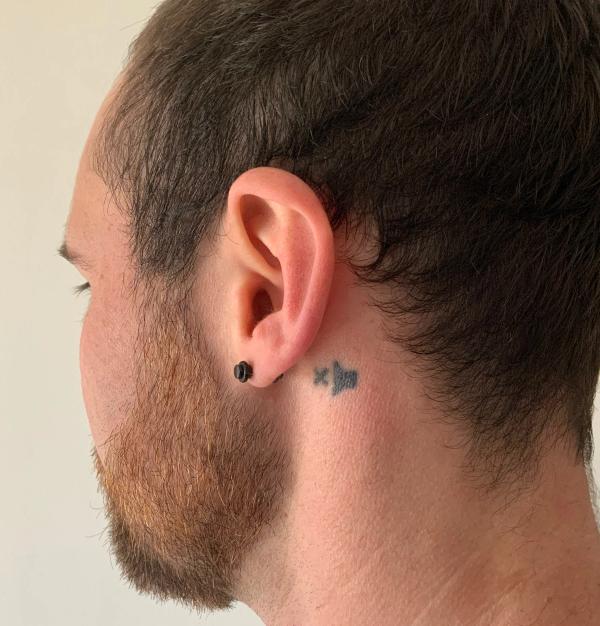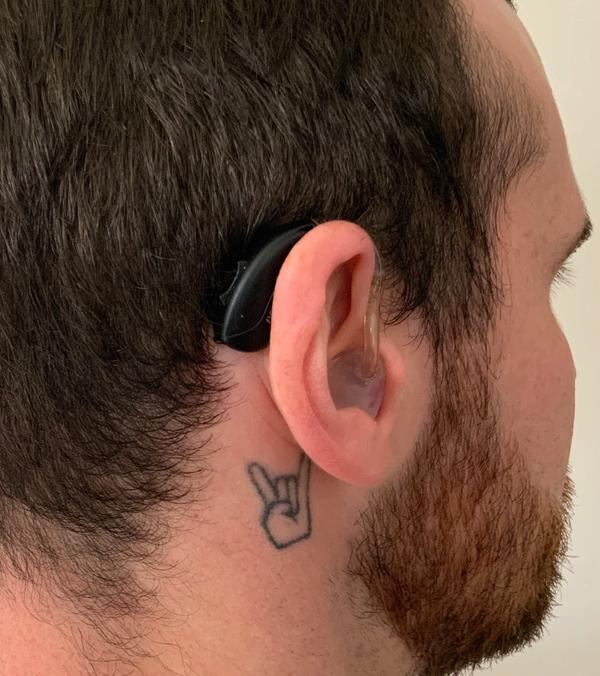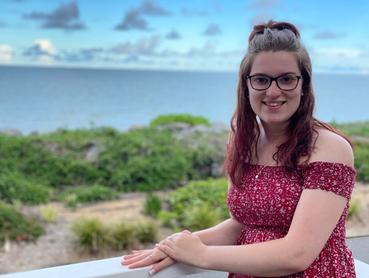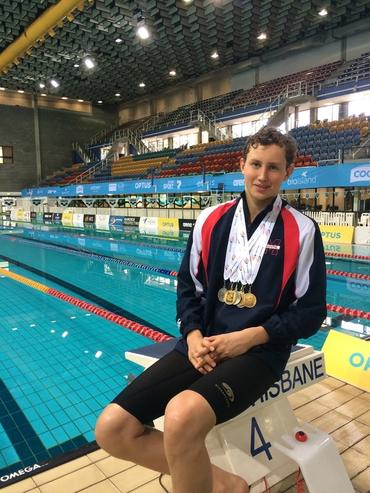My Story, Growing up Deaf- Lachlan Johnson
'I'm extremely proud of my Hard of Hearing identity. I probably wouldn't be the mentally strong and confident person I am today without my hearing loss journey'.

Hi i'm Lachie. I'm extremely proud of my Hard of hearing identity, and probably would not be the mentally strong and confident person I am today without going through my hearing loss journey. My answers are not intended to push my opinions on, or offend whoever is reading, I am simply answering based off my own experiences.
Do you identify as Deaf or Hard of Hearing? Tell us about your diagnosis as a child?
I am a Hard of Hearing individual; I actually went through childhood as a hearing person. I was 15 years old, it was a regular beautiful sunny Saturday and I had just finished my regular basketball game when suddenly the world started spinning around me and I could barely stand up on my own two feet, to cut a lengthy story short, what started as a random aggressive attack of Vertigo resulted in years of hospital admissions, Doctors and Specialist appointments.when finally, I was given possible answers but still do this day do not have a true diagnosis, without listing them all, Vestibular Neuritis seemed to be the most likely suspect. Among other side effects due to this experience which I now manage daily, I lost most of my hearing, I have a profound deafness in my left ear and moderately severe deafness in my right ear.
If and what age were you fitted with a hearing aid or cochlear implant and what was that like?
As my hearing deteriorated over a 6-month span in rather large portions at a time I was fitted with multiple hearing aids during this.
A day or two after I got out of hospital for the first time after my first Vertigo episode, I thought I must have a blocked ear or infection, but a trip to the GP confirmed my ear was not infected. So I was referred to see an Audiologist and it turned out I had moderate hearing loss in my left ear, so I was fitted with a small in the ear moulded hearing aid, I remember when I first put it in and turned it on my mum's and the audiologist's voices sounded like they had a metal twang to them, the best way I can think to describe voices through a hearing aid is imagine how people would sound if they had a robot accent. I really tried to get into the habit of wearing it but at that time I still had enough residual hearing to get away with not wearing it. About 2 months later I had another episode of Vertigo and ended up in the hospital again. I woke up in the middle of the night only hearing a loud ringing noise in my left ear, I already knew what had happened. Another hearing test confirmed I had lost all my hearing in my left ear. So, I only had a hearing aid for my left ear for about two months before it became pointless to wear one. For a few months I was fully deaf on my left side and had full hearing on my right side.

About 2 - 3 months later, I did not have another attack of Vertigo, but I woke up in the middle of the night this time hearing the loud ringing in my right ear, Again I knew what was happening and I knew it was time to start accepting that I might lose it all. Mum took me to the audiologist again the following day and I was fitted with a hearing aid for my right ear, when I first put it in everyone sounded like they had that mechanical twang/robot accent I mentioned before to them and when I walked out of the audiologist wearing it noises like cars driving by and people boots clip clopping on the ground stood out to me straight away. It’s different to natural hearing as hearing aids do not block out any background noise, what I mean by this is noise that a hearing person cannot even notice is there. For example the first time I went out for dinner in a busy restaurant wearing my hearing aid, I realised there is a sea of background noise, people talking at other tables, glasses clanging, the coffee machine steaming. To a hearing person the brain will naturally dull all of this noise to the distant background of their mind and ears, but when you have a hearing aid you really notice all this stuff, especially at first when you’re not used to it yet, as it does not fade into the background because everything is amplified through the hearing aid, not just the noises I wanted to focus on like my mate sitting and speaking across from me.At first it was mentally draining focusing so hard on what teachers, doctors, peers and so on were saying while trying not to miss out on information or ask them to repeat themselves over and over again for me. Over time with plenty of frustration, patience and focus it slowly started to get a little easier my brain was adjusting to my new normal, peoples voices slowly lost that metal twang and just sounded like voices again.

Now some 13 years later I don’t really know any different, everything is and sounds like it should to me and to be honest I don’t really remember what it was like anymore to have full hearing.
Are you oral and if so, what was your experience like learning spoken language?
As I mentioned in the ‘identity’ question, I actually grew up until I was 15 years old as a hearing person, so my spoken English skills were already well established by the time I became Hard of Hearing (HOH). Out of respect for people who are/were born and grew up Deaf/HOH I can’t really answer this question from experience.
Do you use Auslan or lipread, what age did you begin learning?
This depends on the situation I am in; Here are a few examples.
Also, these are examples with my hearing aid in, without it I can only hear louder noises and speech at a normal volume if I am close to someone.
- when I am somewhere where there is little to no background noise like at home, I can understand speech without having to look at the person at all.
- I am a chef by trade, generally in kitchens most communication is done at a louder than normal volume so I can understand speech for the most part, but I am always open and upfront about my hearing wherever I am/was working, and most people I have worked with haven’t minded if I asked them to repeat themselves for me.
- When I am having dinner with a group of friends at a restaurant, I can understand speech, but I do have to focus on that person’s voice with a combination of watching their lips.
I have started my Auslan journey in 2021 at 27 years old, and will continue to learn until I am fluent, I only see benefits to learning this language and had been wanting to get involved in Auslan and the Deaf community for a while now, but didn’t really know where to start. If I could go back in time and give myself one piece of advice it would be, don’t be scared to get involved with the Deaf community and learn Auslan.
How do you communicate within your family and amongst friends?
As I am the only person in my family and my social group that is HOH, I always use spoken English to communicate. My family is very supportive of me and were throughout my hearing loss journey. My Mum and Dad encouraged me to learn Auslan and they also wanted to learn themselves when I lost my hearing, but unfortunately at that time, I was experiencing a whirlwind of emotions accepting my new situation, not understanding why it happened to me. The teenage mind is a confused place, I was not a real confident kid and the sudden change that had happened to me didn’t resonate well within my mind. At that time it was easier for me to just put my hearing aid in and pretend nothing had changed and neglect the fact that Auslan, and the services that became available to me would be a true benefit to my life. Now only just beginning to get involved with Auslan and the Deaf community I am seeing what I have missed out on.It’s an interesting thought, wondering where I would be now had I started getting involved then… but hindsight is always a beautiful thing.
I have used what Auslan knowledge I have with my colleagues but am not yet at a level of fluency that a lot of them are at, but it's ok, I will get there. I’m not scared to have a go and push myself to learn plus they are very understanding and supportive if I’m signing a bit slow or make a mistake.
Tell us about going to school - what was that like? Did you have any help/ or assistance throughout your education?
When I look back at myself and how I handled my situation in high school, with the knowledge, experience and confidence I have now, I would have done a lot of things differently, I probably should have changed schools to somewhere with a deaf inclusive environment. When I got back to school, they received some government funding to assist me in the classroom and with a support worker/ tutor but I was too embarrassed to have someone in the classroom with me, so unfortunately I chose to refuse that service at that time. My teachers were all aware of my new situation and class discussions were such a big thing, particularly in English class I found it difficult to get involved but I managed to get all my work done by ensuring I was reading everything properly. Most of my other subjects were creative based where the environment felt a lot more relaxed and I don’t know why, we still had assignments, due dates and the dreaded class discussions, but I felt more at ease getting involved, asking the teacher questions and making mistakes. I think this has more to do with me as a person who just feels more comfortable around creative people in a creative environment.
I did have a fantastic support worker who was Deaf herself visit me once a week in the school office, it could have been more than once a week, but I only accepted the bare minimum. She helped me with my schoolwork when I needed assistance. She was very encouraging and patient but most importantly, cared about me and my HOH journey, probably more than I did at that point in time. Unfortunately, I just wanted to go to my weekly session with her and be out of their as quickly as possible. I can’t believe that I did not take advantage of such an amazing opportunity, this person had plans for me to get involved with deaf social groups, deaf sports and deaf events and I just refused, refused, refused.
What hobbies do you have? Did you play a sport- tell us about it?
I LOVE Music, I learnt guitar growing up and still pick it up from time to time and strum a few chords, though I am no longer as good at it as I once was. When I started working as at Chef at 18 years old from mornings to late in the evenings I just fell out of practice, I have recently got myself a bass guitar and have been learning a few things from YouTube so I’ll see where I get to with that, but I’m pretty much always listening to music, when I’m driving, cooking at home, at the gym etc…
I have played basketball my whole life, I started when I was about 8 and still play to this day. I missed about a year when I got sick but couldn’t wait to get back into it once I started feeling better. I love the game of basketball so much I plan to continue playing until my body doesn’t let me anymore, after lock-downs have finished I am hoping to get involved with Deaf basketball Australia and Victoria.
Can you think of some challenges you faced at school, in public, at work or playing sport?
At the end of the day, we are missing one of our senses that most of the general population has. There will always be challenges but when you surround yourself with good people there will always be a solution for inclusion.
The main challenge for me at school was the fact that I stayed in a mainstream school that did not have deaf facilities, so I felt isolated. The teachers weren’t trained to educate someone with said needs and that is not their fault at all, but I also did not help myself because I chose not to change schools and only accepted the bare minimum of support that was offered to me.The only reason I did not change school was because when I was that age I was not properly thinking about my future, I was thinking about my crew of mates, and that high school would never end.
I have played basketball my entire life, when I re-joined my teams while they were stoked to have me back and I was so glad to be back playing the sport I love. I discussed with the coaches my situation and like any good teams do we worked together. I play without my hearing aid because otherwise it gets covered in sweat and ends up breaking. I explained I can hear in the team huddle as we are all close enough that we are bumping shoulders then, but on the court when myself or someone else was calling out our ‘plays’ it would be done verbally as well as accompanied by a hand gesture that was generally a number or just something we made up and all knew what it meant.
One thing in public that I’m sure most people would not even think about, is when you are wearing a hearing aid outside without a hat or a beanie on and it is a windy day, the ‘whooshing’ of the wind by my ear is so loud that I can’t hear if someone is speaking to me unless I turn my head on an angle where it isn’t, which is not always the most natural feeling way to have a conversation.
A recent example in public settings is face masks and glass screens, while I understand their importance living in this current covid world, they take away so much volume from a person’s voice, plus the ability to watch their lips. I have had to ask people on multiple occasions if they don’t mind pulling it down just while they speak to me or talk louder depending on what they are comfortable doing because otherwise it’s difficult for me to understand what they’re saying, especially if they have a naturally soft voice.
I think by the time I started working full time in kitchens I had fully adapted to my new normal level of hearing. It's still a lot of effort to communicate with others but it's just something that I've adapted to. I had a few people talk slower and over exaggerate their mouth movements when I asked them to repeat themselves, but I shut that down pretty quickly by just saying no, talk normally please but a little louder or let me walk closer to you.
What advice can you give young deaf and hard of hearing people who might be experiencing similar challenges?
My advice to people going through the experience of losing their hearing a little later in life, whether it’s like me at 15, later down the track at 20 or earlier than me at 12.Whether you believe me straight after reading this or not, you are going to be ok. I encourage you to use all the resources and supports that become available to you and use them to your advantage, don't be scared or embarrassed about being a little ‘different’ just because you can’t hear, it builds strength and resilience in character and will assist you with your ambitions for the future. I encourage you not to listen to self-doubt or the myth that you cannot aim as high as anyone else for your goals in life. I also encourage you to get involved in the Deaf community and try and learn Auslan because who knows? You might like it.
Tell us about some of your dreams and future ambitions.
I have no plans to leave Deaf Children Australia as I am involved with and organisation that shares the same values as myself and when I complete my goal of getting my Diploma in Auslan I’m sure there will be plenty of full-time opportunities within the organisation for me to pursue a career in.
I would also love to further Study interpreting when I feel my Auslan is at a high enough level and learn how to become a live music interpreter.
From your point of view, what key message would you give parents who are starting out their journey with a deaf/hard of hearing child?
- I think my colleges who were born deaf will have fantastic thoughts, views and messages for parents who are starting out their journey with a deaf/HOH child.
- My message to parents who have a child who loses most or all of their hearing a little later down the track who like myself have no family or family history of deaf/HOH is this:
I think it’s natural that they will become upset about suddenly becoming ‘different’ to their friends and family knowing that their life has just made a permanent change so early on so encourage them to express their thoughts, feelings and concerns in a healthy way, create a safe space without the fear of judgement.
I believe getting them to meet someone who is going through or has gone through a similar situation is essential as it gets rid of the ‘why only me?’ at the back of the mind.If you have been to an Audiologist chances they will be able to get you in contact with someone who will volunteer their time meet up and share their journey and experiences to assist in whatever way they can, otherwise places like Deaf Children Australia are just a google search away, I’ve heard their youth team there is pretty cool too.



